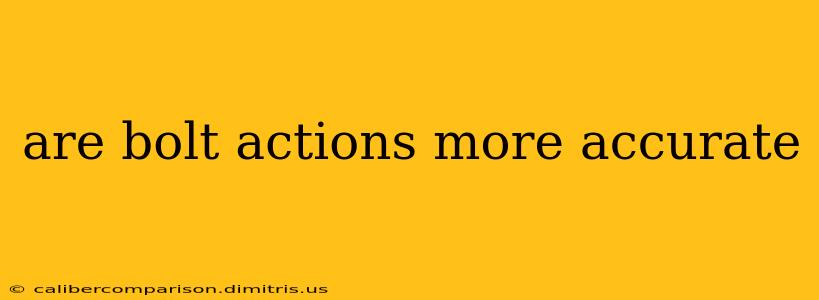The question of whether bolt-action rifles are inherently more accurate than other rifle types is a complex one, often debated among firearms enthusiasts. The short answer is: not necessarily. While bolt-actions can be incredibly accurate, their accuracy isn't solely determined by the action type itself, but rather a confluence of factors. This article will delve into these factors to provide a nuanced understanding of accuracy in rifles.
Understanding Accuracy and Precision in Firearms
Before comparing rifle types, it's crucial to understand the difference between accuracy and precision:
-
Accuracy: Refers to how close a group of shots is to the point of aim. A highly accurate rifle will consistently place shots near the bullseye.
-
Precision: Refers to how tightly grouped the shots are, regardless of where they are relative to the point of aim. A precise rifle might have shots clustered closely together, but off-center from the target.
A truly superior rifle exhibits both high accuracy and high precision.
Factors Affecting Rifle Accuracy
Numerous factors influence a rifle's accuracy, irrespective of the action type:
1. The Barrel:
- Manufacturing Quality: A precisely manufactured barrel with a consistent bore diameter and rifling is paramount for accuracy. High-quality barrels often feature superior materials and tighter tolerances.
- Barrel Length: Longer barrels generally provide better accuracy due to increased bullet velocity and more complete powder burn.
- Barrel Condition: A damaged or fouled barrel will significantly reduce accuracy. Regular cleaning and maintenance are essential.
2. The Ammunition:
- Ammunition Quality: Consistent ammunition with precise tolerances is crucial. Variations in powder charge, bullet weight, and bullet seating depth can dramatically affect accuracy.
- Ammunition Type: Certain ammunition types are better suited to specific rifles. Experimentation is often needed to find the optimal load for a particular firearm.
3. The Stock:
- Stock Material and Design: A well-designed stock provides a stable platform for shooting, contributing to accuracy. Materials like high-quality wood or synthetic polymers are preferred.
- Stock Fit: A stock that doesn't fit the shooter properly can negatively impact accuracy due to inconsistent hold and recoil management.
4. The Scope (If Used):
- Scope Quality: A high-quality scope with good optics and clear adjustments is essential for accurate long-range shooting.
- Scope Mounting: Proper scope mounting is crucial to ensure zero retention and consistent point of impact.
5. The Shooter:
- Shooting Technique: Proper shooting technique, including proper breathing, trigger control, and follow-through, is the most significant factor influencing accuracy. Even the finest rifle will not perform well in the hands of an inexperienced shooter.
- Environmental Conditions: Wind, temperature, and humidity can affect bullet trajectory and accuracy.
Bolt-Action Rifles: Advantages and Disadvantages Regarding Accuracy
While bolt-actions aren't inherently more accurate, several features can contribute to their reputation for precision:
Advantages:
- Smooth, Controlled Operation: The bolt-action's smooth operation allows for deliberate and consistent shot placement.
- Less Vibration: Generally, bolt actions produce less vibration during firing than some semi-automatic or automatic rifles, potentially leading to improved group size.
- Better for Long-Range Shooting: Their controlled operation makes them suitable for longer-range shooting, where accuracy is paramount.
Disadvantages:
- Slower Rate of Fire: The slower rate of fire is a significant drawback in situations requiring rapid engagement.
- Not Ideal for Close-Quarters Combat: Their slower firing rate makes them less effective in close-quarters combat scenarios.
Conclusion: It's Not the Action, It's the System
Ultimately, the accuracy of a rifle isn't determined solely by the action type (bolt-action, semi-automatic, etc.). It's the synergistic effect of all the components—barrel quality, ammunition consistency, stock design, scope quality, and shooter skill—that determine the overall accuracy and precision of the firearm. A well-maintained and properly used bolt-action rifle can be extremely accurate, but a poorly maintained or improperly used rifle of any action type will underperform. The focus should always be on the entire system, not just the action type.

